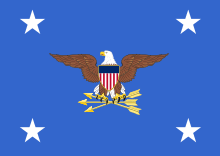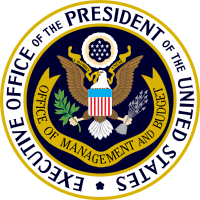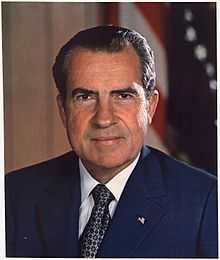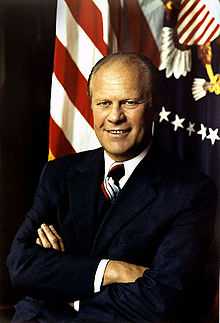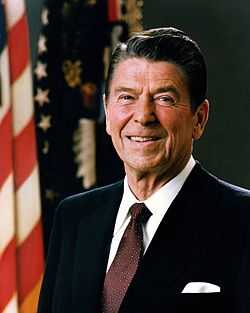Caspar Weinberger
| Caspar Weinberger | |
|---|---|
 | |
| 15th United States Secretary of Defense | |
| In office January 21, 1981 – November 23, 1987 | |
| President | Ronald Reagan |
| Deputy | Frank Carlucci (1981–1983) W. Paul Thayer (1983–1984) William Howard Taft IV (1984–1987) |
| Preceded by | Harold Brown |
| Succeeded by | Frank Carlucci |
| 10th United States Secretary of Health, Education, and Welfare | |
| In office February 12, 1973 – August 8, 1975 | |
| President | Richard Nixon Gerald Ford |
| Preceded by | Elliot Richardson |
| Succeeded by | Forrest David Mathews |
| 20th Director of the Office of Management and Budget | |
| In office June 12, 1972 – February 1, 1973 | |
| President | Richard Nixon |
| Preceded by | George P. Shultz |
| Succeeded by | Roy Ash |
| 42nd Chairman, United States Federal Trade Commission | |
| In office December 31, 1969 – August 6, 1970 | |
| President | Richard Nixon |
| Preceded by | Paul Rand Dixon |
| Succeeded by | Miles W. Kirkpatrick |
| Personal details | |
| Born | Caspar Willard Weinberger August 18, 1917 San Francisco, California, USA |
| Died | March 28, 2006 (aged 88) Bangor, Maine, USA |
| Political party | Republican |
| Spouse(s) | Jane Weinberger (1942–2006; his death; 2 children) |
| Alma mater | Harvard University (A.B, J.D.) |
| Profession | Attorney |
| Religion | Episcopalian |
| Military service | |
| Service/branch | United States Army |
| Years of service | 1941–1945 |
| Rank | Captain |
| Unit | 41st Infantry Division |
| Battles/wars | World War II |
Caspar Willard "Cap" Weinberger, GBE (August 18, 1917 – March 28, 2006), was an American politician and businessman. As a prominent Republican,[1] he served in a variety of prominent state and federal positions for three decades, including Chairman of the California Republican Party, 1962–68. Most notably he was appointed Secretary of Defense under Republican President Ronald Reagan from 1981 to 1987.[2]
Born in San Francisco, California, Weinberger served in the 41st Infantry Division in the Pacific theater of World War II. His entry into politics was as a California State Assemblyman from 1953 to 1959, and he would go on to serve as Chairman of the Federal Trade Commission and Director of the Office of Management and Budget under Presidents Richard Nixon and Gerald Ford. An accomplished private sector businessman, he later became vice president and general counsel of Bechtel Corporation, and still later Chairman of Forbes.
His tenure as Secretary of Defense is the third longest in U.S. history, and spanned the final years of the Cold War. He is also known for his key role in the administration's Strategic Defense Initiative and later indictments in the Iran–Contra affair. He was awarded both the Presidential Medal of Freedom in 1987 and an honorary British knighthood from Queen Elizabeth II.
Early life
Weinberger was born in San Francisco, California, the younger of two sons of Herman Weinberger, a Colorado-born lawyer. His mother, the former Cerise Carpenter Hampson, was an accomplished violinist. His father was of Jewish Bohemian descent, while his maternal grandparents were immigrants from England.[3] Weinberger had stated that his mother's Episcopal religion was "an enormous influence and comfort all my life".[4] Weinberger was named "Caspar" for a friend of his mother's; his father began calling him "Cap", a nickname that stuck into adulthood.
Weinberger was a first cousin of the nationally-broadcast radio personality Don McNeill of Don McNeill's Breakfast Club. Caspar Weinberger's father Herman was the younger brother of Luella Weinberger McNeill, mother of Don McNeill. The 1910 Census shows Herman and Luella living in the household of Nathan Weinberger, the grandfather of Caspar Weinberger.
Weinberger's paternal grandparents had left Judaism because of a dispute at a Bohemian synagogue. He was reared in a home with no denominational ties, though with a general Christian orientation. Weinberger would later become an active Episcopalian and often expressed his faith in God.[5]
Education
Although Weinberger was a sickly child and required close nurturing from his mother (though he would overcome his poor health and shyness), he attended San Francisco Polytechnic High School. He was academically gifted and gained admission to Harvard University.
When he enrolled at Harvard University in Cambridge, Massachusetts, Mrs. Weinberger rented an apartment nearby for the first semester that Weinberger and his older brother, Peter, attended Harvard. She then returned to her husband in San Francisco. Weinberger received his Bachelor of Arts in anthropology, magna cum laude, in 1938 and a Juris Doctor degree in 1941, both from Harvard. He edited the Harvard student newspaper, The Harvard Crimson, and recalls in his memoirs entitled In the Arena: A Memoir of the 20th Century two specific interviews of which he was most pleased: one with the highly decorated soldier Theodore Roosevelt, Jr., and another with Alabama-born actress Tallulah Bankhead.
Prior to his attending Harvard Law School, Weinberger had been offered a scholarship to study at the University of Cambridge.[6]
Military service
He entered the United States Army as a private in 1941, was commissioned as a second lieutenant at the United States Army Officer Candidate School in Fort Benning, Georgia, and served with the 41st Infantry Division in the Pacific. At the end of the war he was a captain on General Douglas MacArthur's intelligence staff. Early in life, he developed an interest in politics and history, and, during the war years, a special admiration for Winston Churchill, whom he would later cite as an important influence in his life. From 1945–1947, Weinberger worked as a law clerk for a federal judge before joining a San Francisco law firm.
Political career
In 1952, Weinberger entered the race for California assemblyman in the San Francisco Bay area as a Republican at the persuasion of his wife, Jane Weinberger,[7] who also served as his campaign manager.[8] He won and was reelected in 1954 and 1956. As the Chairman of the Assembly Government Organization Committee, Weinberger was responsible for the creation of the California Department of Water Resources and was instrumental in the creation of the California State Water Project. Weinberger also unsuccessfully opposed the construction of the Embarcadero Freeway saying it would ruin the view of the Bay and damage property values.[9] Weinberger felt vindicated when the freeway was removed after the 1989 earthquake. Although unsuccessful in his 1958 campaign for California Attorney General, Weinberger continued to be active in politics and was chosen by Nixon in 1962 to become chairman of the California Republican Party.
Governor Ronald Reagan named him chairman of the Commission on California State Government Organization and Economy in 1967 and appointed him State director of finance early in 1968. Weinberger moved to Washington in January 1970 to become chairman of the Federal Trade Commission. He is credited for having revitalized the FTC by enforcing consumer protection.[10]
He subsequently served under President Richard Nixon as deputy director (1970–1972) and director (1972–1973) of the Office of Management and Budget and Secretary of Health, Education, and Welfare (1973–1975). While serving in the Office of Management and Budget, Weinberger earned the nickname "Cap the Knife" for his cost-cutting ability. For the next five years, Weinberger was vice president and general counsel of the Bechtel Corporation in California.
Secretary of Defense
Although not widely experienced in defense matters, Weinberger had a reputation in Washington as an able administrator; his powers as a cost cutter earned him the sobriquet "Cap the Knife." He shared President Reagan's conviction that the Soviet Union posed a serious threat to the United States, and that the defense establishment needed to be modernized and strengthened. Belying his nickname, at the Pentagon Weinberger became a vigorous advocate of Reagan's plan to increase the Department of Defense budget. Readiness, sustainability, and modernization became the watchwords of the defense program. In his early years at the Pentagon, Cap Weinberger was known as "Cap the Ladle" for advocating large increases in defense spending.

As Secretary of Defense, Weinberger oversaw a massive rebuilding of US military strength. Major defense programs he championed included the B-1B bomber and the "600-ship Navy". His efforts created economic and military-industrial pressures that were associated with the beginning of Perestroika and the beginning of the end of both the Cold War and the Soviet Union.[11] However, this thesis was contested by the extensive study on the causes of the collapse of the Soviet Union by two prominent economists from the World Bank – William Easterly, and Stanley Fischer from MIT: "… the study concludes that the increased Soviet defense spending provoked by Mr. Reagan's policies was not the straw that broke the back of the Evil Empire. The Soviet war in Afghanistan and the Soviet response to Mr. Reagan's Star Wars program caused only a relatively small rise in [USSR] defense costs. The massive US defense effort throughout the period from 1960 to 1987 contributed only marginally to Soviet economic decline."[12]
The same study points out the key reason for the economic decline of the USSR was relying on centrally-planned industrial-expansion to drive economic growth, rather than driving growth by increasing worker productivity via incentives; France and Japan were also mentioned (in 1994) as other centrally-planned economies that could soon experience similar troubles.[12] While the Reagan Doctrine was not a key factor in causing the economic implosion of the USSR, which was driven by internal contradictions, the Reagan proxy-rollback policy of the 1980s (which replaced Détente that Nixon and Carter generally pursued during the 1970s) was the key factor[13] in preventing expansion of the Soviet economic empire, and sustenance of their declining domestic economy from external sources. Reagan was one of the few people to predict this possibility. The final piece of the puzzle was the Soviet leadership: Brezhnev, Andropov, and Chernenko were hardline Communists, and prevented any significant changes, but Gorbachev was a reformer—and once economic reforms and political reforms began, they became unstoppable, as foreseen in 1977:
I do not believe it possible that the thirst for freedom and decency in the countries of the Soviet Empire can remain much longer unslaked, and that any attempt... to satisfy it by real reforms, will be cataclysmically destructive of the eroded foundations of the entire State system. ...there will be no stopping the tide once the first sluice has been opened. Memories of the Czech tragedy of 1968 will still be fresh … the most significant element of the Prague Spring was the way in which, once Mr Dubcek had shown that he supported the Czech desire for liberation, no attempt by him and his equally brave colleagues to go slowly proved availing — the scent of freedom in the nostrils of his people was too strong.[14]
These events came at the cost of helping to triple the US national debt, and funding radicals. Weinberger pushed for dramatic increases in the United States' nuclear funding, and was a strong advocate of the controversial SDI, an initiative which proposed a space- and ground-based missile defense shield. [15]
Weinberger was reluctant to commit the armed forces, keeping only a token force of American marines in Lebanon that then became victims in the 1983 Beirut barracks bombing.[16]
Unlike President Reagan and Secretary of State Shultz, Weinberger did not regard any of Gorbachev's actions—whether it was perestroika or glasnost—as reassuring indicators of his stated intentions.[17] "Not only did Gorbachev give up all of the Soviet 'non-negotiable' demands [regarding the INF Treaty], but he gave us precisely the kind of treaty that the President had sought for seven years. That act of course does not mean—any more than does the Soviet withdrawal from Afghanistan—that the USSR has given up its long-term aggressive designs."[17] Initially, Reagan's views were in line with Weinberger's views, but he began to reevaluate his perception of Gorbachev's intentions in 1987, the year Gorbachev accepted the U.S. proposal on INF.[18]
Iran–Contra affair
The Iran–Contra affair concerned the selling of US missiles to Iran. The funds received from Iran were then channeled to guerilla freedom fighters known as Contras, who were fighting the socialist government of Nicaragua.[19] Such funding had been specifically denied by the US Congress. Though he claims to have been opposed to the sale on principle, Weinberger participated in the transfer of United States Hawk and TOW missiles to Iran during the Iran–Contra affair.
This resulted in scandal and several investigations which resulted in fourteen administration officials being indicted, including Caspar Weinberger who resigned before trial.[20][21][22] Following his resignation as Secretary of Defense, legal proceedings against him were brought by Independent Counsel Lawrence E. Walsh. A federal grand jury then indicted Weinberger on two counts of perjury and one count of obstruction of justice on June 16, 1992.[23] He was defended by defense attorney Carl Rauh.
Prosecutors brought an additional indictment four days before the 1992 presidential election. This was controversial because it cited a Weinberger diary entry contradicting a claim made by President George H.W. Bush. Republicans claimed that it contributed to President Bush’s defeat. On December 11, 1992, Judge Thomas F. Hogan threw out the indictment because it violated the five-year statute of limitations and improperly broadened the original charges.[24]
Before he could be tried on the original charges, Weinberger received a pardon from President George H. W. Bush, who was Reagan's vice president during the scandal, on December 24, 1992.[21]
Later career
Weinberger had been Secretary of Defense for six years and ten months, longer than any man except for Robert McNamara and more recently Donald Rumsfeld. After Weinberger left the Pentagon, he joined Forbes, Inc., in 1989 as publisher of Forbes magazine. He was named chairman in 1993. Over the next decade, he wrote frequently on defense and national security issues. In 1990, he wrote Fighting for Peace, an account of his Pentagon years. In 1996, Weinberger co-authored a book entitled The Next War, which raised questions about the adequacy of US military capabilities following the end of the Cold War.
He was a member of the Founding Council of the Rothermere American Institute at the University of Oxford.
Family
In 1942, Weinberger married Rebecca Jane Dalton, who was born on March 29, 1918 in Milford, Maine.[8] A World War II Army nurse, and later author and publisher, she "coaxed her husband ... into politics and was a loyal Washington wife during three Republican administrations before she began to write and publish children's books".[7] Jane Weinberger, a uterine cancer survivor, died on July 12, 2009, aged 91, at Bar Harbor, Maine, following a stroke.[7] The couple had a daughter, Arlin, and a son, Caspar. He is also related to Christopher Nels Weinberger (April 6, 1995).
Death
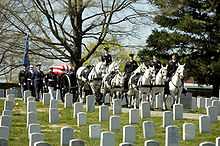
While residing on Mount Desert Island, Maine, Weinberger was treated for and died from complications of pneumonia at Eastern Maine Medical Center in Bangor, Maine, aged 88. He was survived by his wife, the former Rebecca Jane Dalton, their two children and several grandchildren.
He was buried in Section 30, Grave 835-1 at Arlington National Cemetery on April 4, 2006.
Shortly after his death President George W. Bush in a public statement said:
- "Caspar Weinberger was an American statesman and a dedicated public servant. He wore the uniform in World War II, held elected office, and served in the cabinets of three Presidents. As Secretary of Defense for President Reagan, he worked to strengthen our military and win the Cold War. In all his years, this good man made many contributions to our Nation. America is grateful for Caspar Weinberger's lifetime of service. Laura and I send our condolences and prayers to the entire Weinberger family."[25]
Then United States Secretary of Defense Donald Rumsfeld stated:
- "Cap Weinberger was a friend. His extensive career in public service, his support for the men and women in uniform and his central role in helping to win the Cold War leave a lasting legacy ... He left the United States armed forces stronger, our country safer and the world more free."[26]
Awards
- Presidential Medal of Freedom in 1987.
- Honorary Knight Grand Cross of the Order of the British Empire in 1988, awarded in recognition for an "outstanding and invaluable" contribution to military cooperation between the UK and the US, particularly during the Falklands War of 1982.
- Weinberger was awarded the Gold Star Award by the International Strategic Studies Association for Outstanding Contributions to Strategic Progress Through Humanitarian Achievement.
- Caspar Weinberger was inducted into the United States Army Officer Candidate School Hall of Fame in 1981, the highest honor that can be bestowed on any graduate from the school.
- The Walter F. Patenge Medal of Public Service from the Michigan State University College of Osteopathic Medicine in 1975.
References
- ↑ Caspar Weinberger
- ↑ politicalgraveyard.com
- ↑ BBC NEWS Obituary
- ↑ Stout, David (March 29, 2006). "Caspar W. Weinberger, Who Served 3 Republican Presidents, Is Dead at 88". The New York Times.
- ↑ Weinberger, Caspar W.; Roberts, Gretchen (2003). In the Arena: A Memoir of the 20th Century. Regnery Publishing. p. 16. ISBN 978-0-89526-103-8. Retrieved 2010-09-18.
- ↑ Jackson, Harold (29 March 2006). "Obituary: Caspar Weinberg". The Guardian.
- ↑ 7.0 7.1 7.2 Woo, Elaine (2009-07-15). "Jane Weinberger dies at 91; author, publisher and wife of Defense secretary". Los Angeles Times. Retrieved 2009-07-24.
- ↑ 8.0 8.1 Martin, Douglas (2009-07-15). "Jane Weinberger, Author Who Became Publisher, Dies at 91". New York Times. Retrieved 2009-07-27.
- ↑ Norquist, John (1998). Wealth of Cities (1st ed.). Basic Books. p. 164. ISBN 978-0201442137.
- ↑ Niesen, Molly. "The Little Old Lady Has Teeth: The U.S. Federal Trade Commission and the Advertising Industry, 1970–1973". Advertising & Society Review, Volume 12, Issue 4, 2012.
- ↑ Owens, Mackubin Thomas (June 5, 2004). "The Reagan of History: Reflections on the death of Ronald Reagan.". National Review Online. Retrieved April 20, 2006.
- ↑ 12.0 12.1 Dale, Reginald (June 17, 1994). "Many Can Learn From Soviet Downfall". The New York Times. Retrieved April 28, 2010.
- ↑ Knopf, Jeffrey W. (August 2004). "Did Reagan Win the Cold War?". Strategic Insights, Volume III, Issue 8. Center for Contemporary Conflict at the Naval Postgraduate School. Archived from the original on 2009-03-01. Retrieved 2006-04-19.
- ↑ Levin, Bernard (August 1977). "The Most Accurate Prediction in History". The Times (London). Times Newspapers Ltd. Retrieved 2013-01-14.
- ↑ Weinberger, Caspar W. (February 1987). "Weinberger: No Division On SDI". Chicago Tribune (Chicago Tribune). Retrieved 2013-01-13.
- ↑ "Weinberger Reluctant On Bigger Beirut Force". www.nytimes.com (The New York Times Company). October 29, 1982. Retrieved 8 April 2014.
- ↑ 17.0 17.1 Yarhi-Milo, Keren (Summer 2013). "In the Eye of the Beholder: How Leaders and Intelligence Communities Assess the Intentions of Adversaries". International Security 38 (1): 34. doi:10.1162/isec_a_00128. Retrieved 30 July 2013.
- ↑ Yarhi-Milo, Keren (Summer 2013). "In the Eye of the Beholder: How Leaders and Intelligence Communities Assess the Intentions of Adversaries". International Security 38 (1): 35. doi:10.1162/isec_a_00128. Retrieved 30 July 2013.
- ↑ Understanding the Iran-Contra Affairs – The Iran-Contra Affairs
- ↑ Dwyer, Paula. "Pointing a Finger at Reagan". Business Week. Retrieved 2008-04-22.
- ↑ 21.0 21.1 FAS.org
- ↑ "Pardons and Commutations Granted by President George H. W. Bush". United States Department of Justice. Retrieved 2008-04-22.
- ↑ Weinberger charged in Iran-Contra matter
- ↑ Johnston, David, “Charge in Weinberger Case That Caused Furor Before Election is Thrown Out,” New York Times, December 12, 1992. Link: http://www.nytimes.com/1992/12/12/us/charge-in-weinberger-case-that-caused-furor-before-election-is-thrown-out.html
- ↑ Statement by President George W. Bush on Weinberger's death
- ↑ DefenseLink News Article: Former Defense Secretary Caspar Weinberger Dies at 88
External links
| Wikimedia Commons has media related to Caspar Weinberger. |
- Obituary in Fortune magazine
- An interview with Caspar Weinberger (MP3)
- Interview about the MX missiles for the WGBH series
- Booknotes interview with Weinberger on Fighting for Peace, July 15, 1990.
- BBC News obituary
- Caspar Weinberger at Find a Grave
- Baltimore Sun obituary
- Caspar Weinberger at the Internet Movie Database
| Political offices | ||
|---|---|---|
| Preceded by George P. Schultz |
Director of the Office of Management and Budget Served under: Richard Nixon 1972–1973 |
Succeeded by Roy Ash |
| Preceded by Elliot Richardson |
United States Secretary of Health, Education, and Welfare February 12, 1973 – August 8, 1975 |
Succeeded by F. David Mathews |
| Preceded by Harold Brown |
U.S. Secretary of Defense Served under: Ronald Reagan 1981–1987 |
Succeeded by Frank C. Carlucci |
| ||||||||||
| ||||||||||||
| ||||||||
| ||||||||||||||||||||||||||||||||||||||||||||||||||||||||||||||||||||||||||||||||||||||||
| ||||||||||||||||||||||||||||||||||||||||||||||||||||||||||||||||||||||||||||||||||||||||||||||||||||
|
